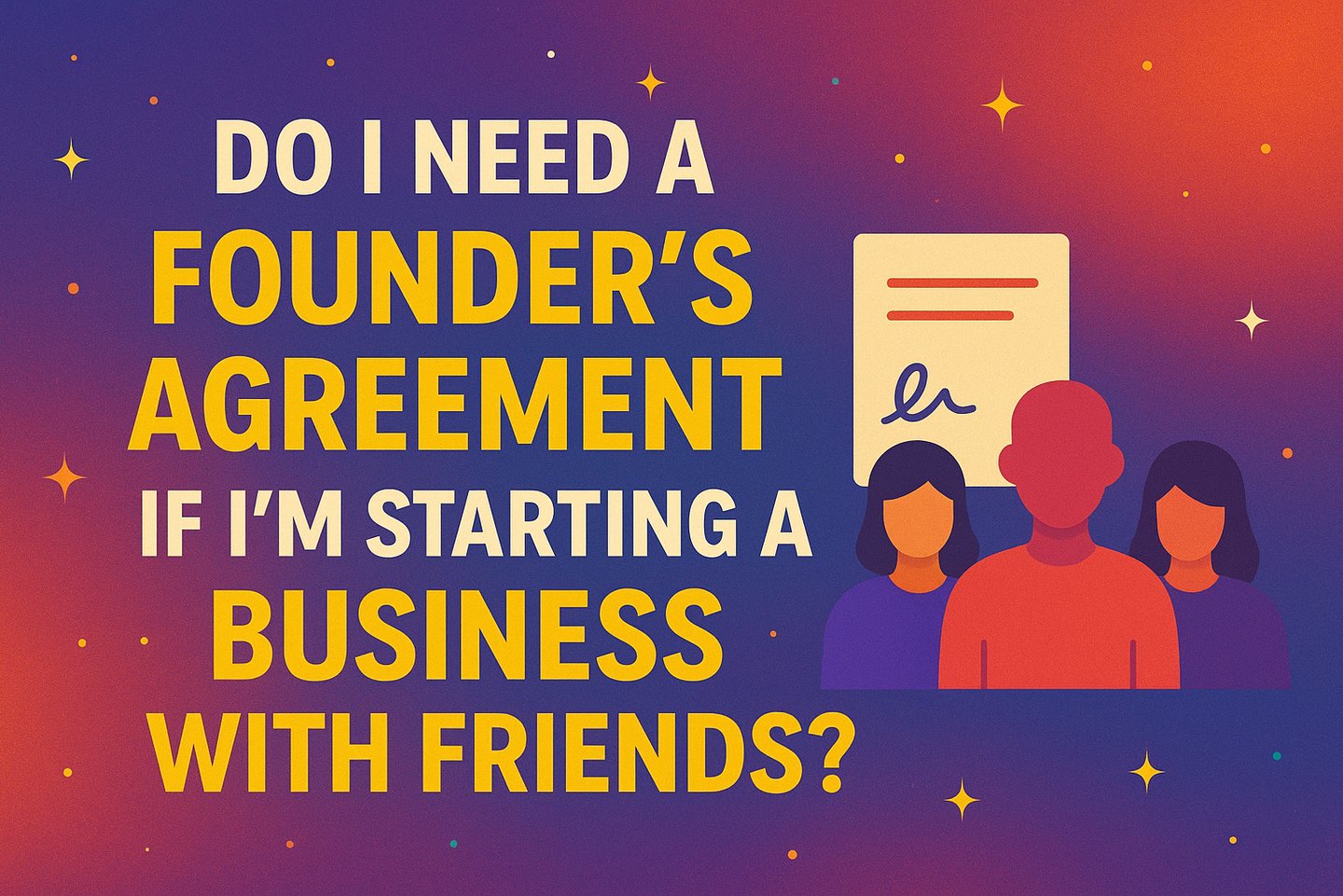Do I Need a Founder’s Agreement If I'm Starting a Business With Friends?
This paper will examine the importance of an agreement between founders in entrepreneurship, particularly in the establishment of a business with friends. It explores the dangers of not formalizing relationships, provides some of the main provisions of an agreement, and describes the ways in which a properly drawn agreement can protect business interests, prevent conflicts, and enhance friendships in the uncertain path of entrepreneurship.
CORPORATE LAWS
Arathi Menon
9/21/20253 min read


Introduction
It appears to be a great idea to start a business with friends and shared vision and mutual trust as the groundwork. Nevertheless, friendship-based and business relationships do not work in the same sphere: distinguishing the rights, obligations, and interests of each of the founding members is the key to success in the long term. (Grayson, 2007) The agreement of founders is not just a formal event but is a critical business instrument. It establishes a level of expectation, limits ambiguity, and offers a safety net, which safeguards the venture and personal relationships. (Geiger, 2014)
The reason why a Founders Agreement is required.
1. Avoids controversies and misunderstandings.
Most startups are not successful because of the conflict between the founders on equity, position, or strategy (Carr & Hmieleski, 2015). An agreement between founders clearly outlines what everyone has to do, what the founders will contribute, and what they will owe, and this is not subject to any misconception. It offers a model on which to settle disputes by organizing formal dispute settlements.
2. Distribution of roles and responsibilities are well defined and this minimizes operational confusion
The distribution of equity ownership eliminates resentment and claims in the future. (Srivastava, 2011)
3. Shields Personality Relations.
It is dangerous to build personal and professional relationships. Even the most robust friendship can be burdened by business issues. An agreement ensures that trust is maintained by formalizing the expectations and securing the interests of both sides, which leads to further cooperation.
4. Provides Legal Protection
An agreement by founders is enforceable in India, and it directs management and administration according to the laid-down statutes (Hellmann & Thiele, 2015). In case of any conflicts and legal action being taken, it will be an essential piece of evidence of terms agreed upon and eliminate threats of lawsuits or dissolution of business.
5. Facilitates Growth and Investment.
The majority of investors and accelerators require founders to have an accord prior to investment (ID). It sends messages of organizational maturity, less risk, and funding, as it helps to show that the firm has been established on strong governance and with clear accountability.
Most important provisions of an agreement among founders.
A total contract generally entails:
1. Share options and vesting plans.
2. Power of decision-making and voting rights.
3. Assignments on intellectual property.
4. Co-operation, responsibilities, and time schedule.
5. Systems of exit of founders, share transfers, or dissolution.
6. Confidentiality, non-compete, and non-solicitation.
7. Deadlock resolving or dispute procedures.
8. Implementing these features is not only pivotal to business architecture but also future-proofing relations in case the situation may alter.
9. Disciplinary Measures of Non-Compliance with the Agreement.
When a business operates without having an agreement between the founders, it is susceptible to various risks:
The uncertainty can cause harmful and expensive conflict. The lack of the registered knowledge poses a danger to the business continuity in case of a founder leaving the business or the desirability to sell them. The issue of intellectual property and share allocation may be controversial, and the court proceedings of litigation or termination of business can last long.
When Should You Create It? Preferably, the agreement between the founders must be signed at the initial stage of the business when all the co-founders are investing time, expertise, or capital. Procrastination on this will put founders at risk and expose them until the signing of formal agreement
Conclusion
Start-ups based on friends and founders cannot exist without a founders agreement. It protects the personal relationship against business pressures, establishes well-defined legal frameworks, and enforces equitable and no-conflict management. Friendships instill trust, but in a business, survival and growth are pegged on professionally recorded mutual terms that are agreed upon. The need to develop and sign a customized founders agreement should be put on the top of the agenda of the entrepreneur when starting his business life—a move that may prove profitable in saving the business, as well as the friendship, over the years.
